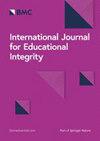诚信游戏:面向本科生的学术诚信在线教学工具
IF 6.9
Q1 EDUCATION & EDUCATIONAL RESEARCH
International Journal for Educational Integrity
Pub Date : 2024-05-02
DOI:10.1007/s40979-024-00154-7
引用次数: 0
摘要
在本文中,我们介绍了Integrity Games( https://integgame.eu/ )--一种关于学术诚信的免费游戏化在线教学工具。此外,我们还介绍了一项随机对照实验的结果,该实验测量了玩 "正直游戏 "的学习效果。正直游戏 "让学生参与到对现实和相关学术正直问题的思考中,这些问题处于良好实践和不端行为之间的灰色地带。因此,它旨在:1)激励学生学习更多有关学术诚信的知识;2)提高他们对灰色地带问题的认识;3)提高他们对不端行为的认识。为了实现这些目标,该工具提供了四个游戏化案例,引导学生进行引人入胜的讲述。衡量学习成果的实验在三个欧洲国家进行,共有来自自然科学、社会科学和人文科学领域的 257 人参加。我们的研究表明,参与者喜欢玩 "正直游戏",游戏提高了他们对灰色地带问题和不当行为的敏感度。然而,所发现的提高与对照组参与者在阅读非游戏化文本时所获得的提高相似。最后,我们根据这些结果讨论了游戏化在在线学术诚信培训中的价值。本文章由计算机程序翻译,如有差异,请以英文原文为准。
Integrity games: an online teaching tool on academic integrity for undergraduate students
In this paper, we introduce Integrity Games ( https://integgame.eu/ ) – a freely available, gamified online teaching tool on academic integrity. In addition, we present results from a randomized controlled experiment measuring the learning outcomes from playing Integrity Games. Integrity Games engages students in reflections on realistic and relevant academic integrity issues that lie in the grey zone between good practice and misconduct. Thereby, it aims to 1) motivate students to learn more about academic integrity, 2) increase their awareness of the grey-zone issues, and 3) increase their awareness of misconduct. To achieve these aims, the tool presents four gamified cases that lead students through an engaging narrative. The experiment to measure learning outcomes was conducted in three European countries, and included N = 257 participants from across natural science, social science and the humanities. We show that the participants enjoyed playing Integrity Games, and that it increased their sensitivity to grey-zone issues and misconduct. However, the increases identified were similar to those achieved by the participants in the control group reading a non-gamified text. We end by discussing the value of gamification in online academic integrity training in light of these results.
求助全文
通过发布文献求助,成功后即可免费获取论文全文。
去求助
来源期刊

International Journal for Educational Integrity
EDUCATION & EDUCATIONAL RESEARCH-
CiteScore
6.90
自引率
26.10%
发文量
25
审稿时长
22 weeks
 求助内容:
求助内容: 应助结果提醒方式:
应助结果提醒方式:


